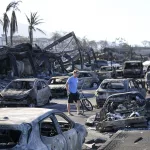(AP) — The Federal Emergency Management Agency said Friday it plans to move thousands of hotel-dwelling survivors of wildfires on the Hawaiian island of Maui into long-term housing over the next month.
The agency expects households living under long-term leases directly funded by FEMA to rise to 1,500 over the next month from 100 currently, TJ Dargan, federal coordinating officer for the Maui fires, said at a news conference.
The increase would house a large portion of the 2,400 households who are still living in hotels months after wildfires scorched historic Lahaina on Aug. 8. Many are stuck in hotels because they have been unable to find rentals in Maui’s exceptionally tight housing market.
FEMA, the state, county and non-profit organizations have urged owners of Maui’s 27,000 short-term rental properties to make their units, which normally house tourists, available to wildfire survivors.
The agency is working with three property managers on Maui and the mayor’s office to identify units that could be rented to wildfire survivors for 18 months. It has found 600 and is pursuing 1,000 more, Dargan said.
The agency has distributed fliers and letters explaining how long-term FEMA leases offer stability.
“So we’ve shaken that tree pretty hard … and will continue shaking that tree until we’ve got sufficient resources for all,” Dargan said at the news conference, which was held in Wailuku on Maui and streamed online.
Other programs are housing hundreds more, including one which has Hawaii families host displaced residents in return for a monthly stipend from the Council for Native Hawaiian Advancement.
FEMA’s hotel short-term stay funding runs out on Feb. 10 but Hawaii Gov. Josh Green has requested an extension that the agency is considering, Dargan said.
Even so, Green said he expects all Lahaina evacuees to be out of short-term hotels by March 1. Months after that, modular homes built around Maui by FEMA and the Hawaii Community Foundation nonprofit will add housing for several hundred more people, according to plans announced by federal, state and county governments and non-profit organizations.
Green in December threatened to use his emergency powers to impose a moratorium on short-term rentals on Maui if officials were unable to line up enough long-term rentals for fire survivors. But he backed away from the statement on Friday.
“If we meet these milestones, it’s very unlikely we’ll need to invoke the moratorium on short-term rentals,” Green said at the news conference.
Kuhio Lewis, the CEO of the Council on Native Hawaiian Advancement, recognized protesters who have been camping on the beach in Lahaina to demand housing for residents.
“This is in response to that kahea,” Lewis said, using the Hawaiian word for call or alarm. “We also recognize how important it is. And now we’re responding.”
© copyright 2024 Associated Press. All rights reserved
AP Photo
